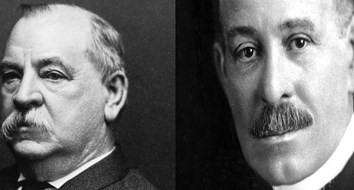Mr. Reed is Assistant Professor of Economics at Northwood Institute in Midland, Michigan. He is director of the college’s summer Freedom Seminars. Also he is co-editor of the recent college text, When We Are Free.
There’s a great deal of talk these days about incentives. An incentive is something which incites one to action. It is a spur, a motive, a provocation, a goad, a stimulus. Economists have long understood that the incentive to act is the prospect of the action yielding benefits to the actor. Because of that fact, particular incentives and incentive structures explain a very great deal of the economic world which swirls around us. People respond to incentives and to their opposite, disincentives. An individual will feel compelled to respond favorably to something which promises great personal benefit at low cost or risk. The same individual will tend to turn away from those things which deliver little or no benefit, especially if they do so only at high cost. He will positively shun those things which would set his progress back, much as a hot stove is a disincentive to bare hands. Human choice is thus influenced by economic incentives and by changes in economic incentives. Let’s take a look at “real world” happenings and see how this might explain some things. Many people complain today about the poor schooling their children receive in public schools. Declining test scores and a breakdown of discipline in the classroom, even as the costs of schooling rise, bear testimony to the failure of public education. Does this happen because public school teachers and administrators do not wish to provide a quality product? Not really. There is no reason to believe that public school teachers and administrators are any less desirous than other people that quality education be imparted. They are, however, responding to a peculiar set of incentive structures. I ask the reader, what would your performance be like if your business could legally draft customers and compel them, under threat of penalty, to buy your product? Suppose you could go a step further and force even those who do not use your product in any way to pay for it—and to continue paying throughout their productive lifetimes! Not exactly a prescription for creativity and productivity, would you say? Why doesn’t the Post Office deliver a better service? For the same reason! Where is the incentive to do better when you have a legal, subsidized monopoly? Self-interest dictates that humans pursue benefits along the paths of least resistance. Compulsory monopolies just do not light fires under too many people. One would be hard put to find any individual who would contribute his own money to encourage others to stop smoking and to promote the growing of tobacco at the same time. No one would regard such a contradiction as being in his self-interest. Yet Congress votes to do both. Why? Because no one spends someone else’s money as carefully as he spends his own. I have every incentive to spend your money on my projects if I can get your money by taxing you. Why do industries and labor unions contribute heavily to political campaigns? It isn’t always to promote better government for everybody. Such groups have an incentive to contribute if the expected returns (favors, protections, subsidies, immunities, and the like) exceed the value of their contributions. If government could not or would not pay off, the contributions would slow to a trickle. The charge is frequently heard that British and Swedish workers have become lazy. They don’t work as hard as they used to. Studies indicate, however, that when these same workers migrate to America, they work harder! The reason for the difference is that the incentives for work in America, in spite of high taxes, are greater than in Britain or Sweden, where taxes are even higher. If one encourages something, one gets more of it and if one discourages something, one gets less of it. That applies to work as much as it does to any other activity. Nowhere is this more poignant than in the Soviet Union. There, 97 per cent of farmland is cultivated “collectively.” The output of the collective farms belongs to the State. The other 3 per cent of farmland is in the form of private plots, whose owners are allowed to sell their produce in a relatively free market. The productivity per acre on the private plots, which account for as much as a third of all agricultural output in the country, is estimated to be 35 to 40 times higher than that on the collectively-farmed land. Workers on the collective farms are not genetically or mentally inferior to those who have private plots. In fact, in many instances, they are the same people! The different incentive structures of collective and private farming explain the situation fully. What about pollution? Why would anyone dump his junk into Lake Erie? Doesn’t he know that it doesn’t belong there? Well, consider the incentives and disincentives a polluter may face. Dumping junk into the lake undetected may be much less costly than alternative methods of disposal. And since no one “owns” Lake Erie, it may be some time before anyone takes notice and complains. Cattlemen of the old West were accused of overgrazing on public lands. They would allow their animals to strip the land bare, leaving it vulnerable to erosion, and then move on. This was land they temporarily leased from the government or acquired free by government grant. With no incentive to maintain the capital value of the land, their actions were perfectly rational. The same men seldom exhibited such callous behavior toward property they bought and paid for and therefore owned outright. Incentives explain so many of life’s events: why higher prices call forth greater supply and why lower prices do not; why racism is tempered in a free market wherein profit-seeking businessmen search for the best labor at the lowest cost; why drug “pushers” appear when drugs are made illegal and then must sell at high prices; why students work harder in a class where excellence is rewarded and failure is penalized; why capitalist economies do better than socialist economies; why some people quit working and go on welfare; and so forth and so on. Finally, those who seek to improve economic life in America today would do well to learn the importance of incentive. In order to stimulate improvement, the disincentives for individual improvement must be abolished. In The Wall Street Journal, David M. Smick recently wrote:
Growth involves ideas and thus is unpredictable. All we can provide is buoyancy—that sense of economic boundlessness where a person can, with energy and initiative, take a new idea as far and as high as he or she wants. If we can keep that initiative from being stifled, as it is today by an inefficient tax and regulatory system, people may once again follow their dreams. Allow entrepreneurs and potential entrepreneurs across-the-board worthwhile returns on their effort and they will start taking risks. Our entire economy will gain in production and jobs, and the nation will regain the energy and opportunity and spirit upon which its greatness depends.*
* David M. Smick, “What Reaganomics is All About,” The Wall Street Journal, July 8, 1981, p. 20.
Incentive—nothing less than the interest one has in his own improvement—will mold the future just as surely as it shaped the past.





